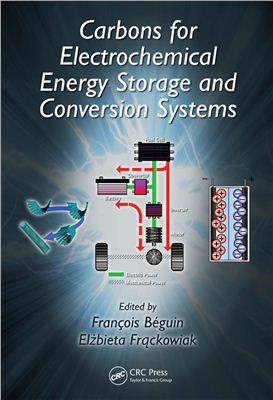CRC Press. 2010. 532 p.
As carbons are widely used in energy storage and conversion systems, there is a rapidly growing need for an updated book that describes their physical, chemical, and electrochemical properties. Edited by those responsible for initiating the most progressive conference on Carbon for Energy Storage and Environment Protection (CESEP), this book undoubtedly fills this need.
Written in collaboration with prominent scientists in carbon science and its energy-related applications, Carbons for Electrochemical Energy Storage and Conversion Systems provides the most complete and up-to-date coverage available on carbon materials for application in electrochemical energy storage and conversion. The text studies different carbon materials and their detailed physicochemical properties and provides an in-depth review of their wide-ranging applications—including lithium-ion batteries, supercapacitors, fuel cells, and primary cells.
Recognizing that most scientists involved with these applications are materials scientists rather than electrochemists, the text begins with a review of electrochemical principles and methods. It then covers the different forms of traditional sp2 carbons, introduces novel techniques for preparing advanced carbons, and describes the main physicochemical properties which control the electrochemical behavior of carbons.
Contents
Principles of Electrochemistry and Electrochemical Methods
Structure and Texture of Carbon Materials
Carbide-Derived Carbons and Templated Carbons
Porous Texture of Carbons
Surface Chemical and Electrochemical Properties of Carbons
Electronic Structures of Graphite and Related Materials
Carbon Materials in Lithium-Ion Batteries
Electrical Double-Layer Capacitors and Pseudocapacitors
Fuel Cell Systems: Which Technological Breakthrough for Industrial Development?
Carbon in Batteries and Energy Conversion Devices
Industrial Production of Double-Layer Capacitors
Advanced Battery Applications of Carbons
As carbons are widely used in energy storage and conversion systems, there is a rapidly growing need for an updated book that describes their physical, chemical, and electrochemical properties. Edited by those responsible for initiating the most progressive conference on Carbon for Energy Storage and Environment Protection (CESEP), this book undoubtedly fills this need.
Written in collaboration with prominent scientists in carbon science and its energy-related applications, Carbons for Electrochemical Energy Storage and Conversion Systems provides the most complete and up-to-date coverage available on carbon materials for application in electrochemical energy storage and conversion. The text studies different carbon materials and their detailed physicochemical properties and provides an in-depth review of their wide-ranging applications—including lithium-ion batteries, supercapacitors, fuel cells, and primary cells.
Recognizing that most scientists involved with these applications are materials scientists rather than electrochemists, the text begins with a review of electrochemical principles and methods. It then covers the different forms of traditional sp2 carbons, introduces novel techniques for preparing advanced carbons, and describes the main physicochemical properties which control the electrochemical behavior of carbons.
Contents
Principles of Electrochemistry and Electrochemical Methods
Structure and Texture of Carbon Materials
Carbide-Derived Carbons and Templated Carbons
Porous Texture of Carbons
Surface Chemical and Electrochemical Properties of Carbons
Electronic Structures of Graphite and Related Materials
Carbon Materials in Lithium-Ion Batteries
Electrical Double-Layer Capacitors and Pseudocapacitors
Fuel Cell Systems: Which Technological Breakthrough for Industrial Development?
Carbon in Batteries and Energy Conversion Devices
Industrial Production of Double-Layer Capacitors
Advanced Battery Applications of Carbons

